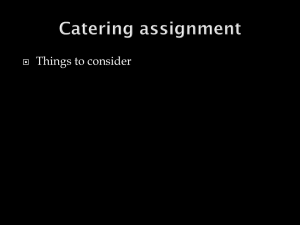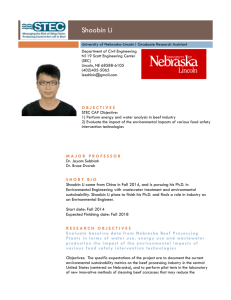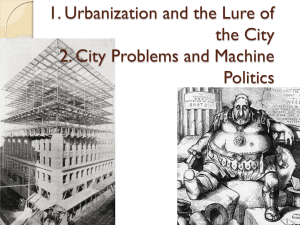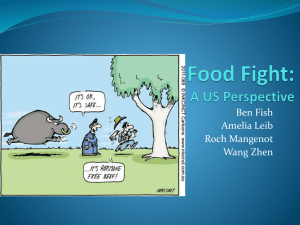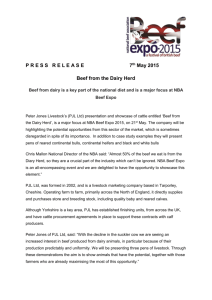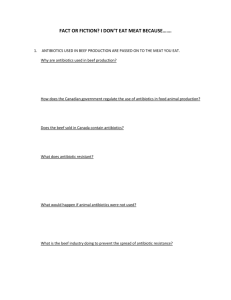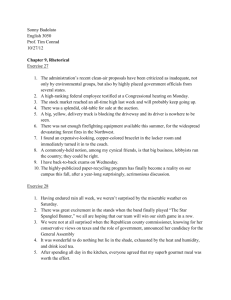ICSA presentation to the Joint Committee on Agriculture, Food and
advertisement
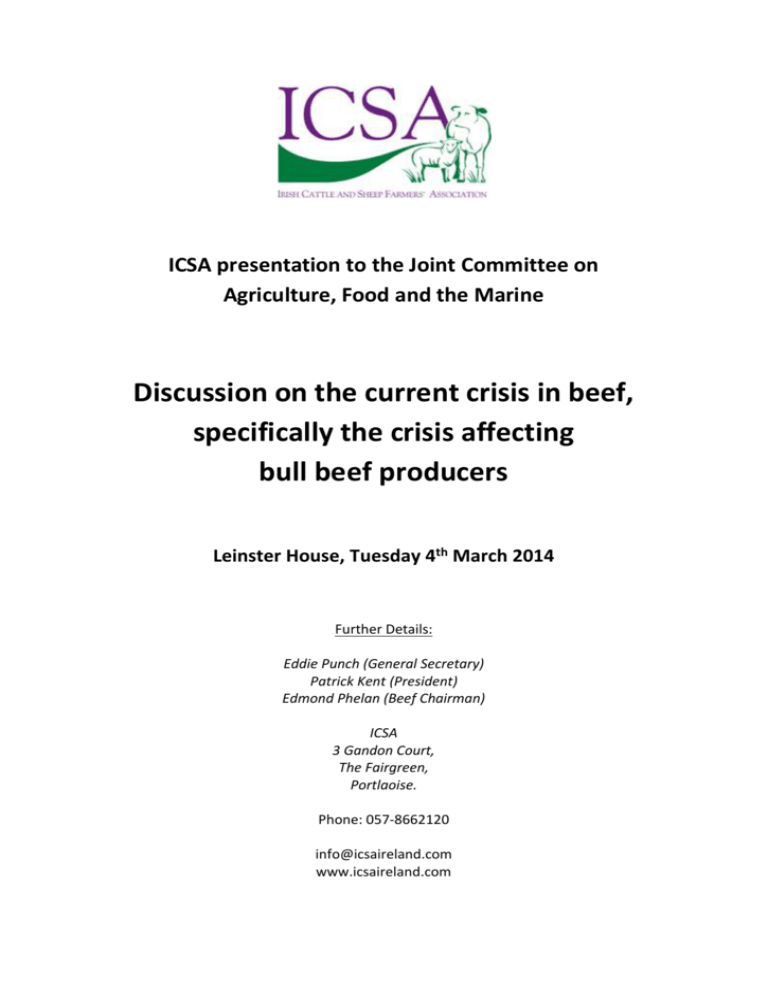
ICSA presentation to the Joint Committee on Agriculture, Food and the Marine Discussion on the current crisis in beef, specifically the crisis affecting bull beef producers Leinster House, Tuesday 4th March 2014 Further Details: Eddie Punch (General Secretary) Patrick Kent (President) Edmond Phelan (Beef Chairman) ICSA 3 Gandon Court, The Fairgreen, Portlaoise. Phone: 057-8662120 info@icsaireland.com www.icsaireland.com Patrick Kent, ICSA President I thank the committee for the opportunity to contribute to the debate on the crisis facing the beef farming sector at the moment. I think that we must begin by emphasising just how serious this is and what the knock on implications are for the suckler sector. It’s disappointing enough to see that steer price is back over 13% compared to its peak last summer. It’s a big problem for winter finishers to see price weakening over the costly winter months. However, the real disaster relates to young bull beef price. Young U3 bulls are on average back 21% since last summer in price. However, average U grade bull price doesn’t even begin to tell the story of how the goalposts have been moved in terms of spec. Nor does it tell the story of the immense pressure being put on winter finishers who are being treated with contempt and who can’t get cattle killed when they need to. Overnight, the bull over 16 months is apparently no longer wanted. Maximum carcase weight has been reduced in some cases to as low as 380kg. Bulls a day over 24 months are worth considerably less than old cows. The impact on the suckler trade is potentially devastating. Suckler farmers producing top of the range continental bull weanlings cannot continue unless there are viable markets for this stock. Live exports are vital but on their own, they are not enough. How can we expect Irish finishers to have confidence to bid for the thousand euro weanling when specs are being changed at the drop of a hat? How can a finisher take advantage of grass to grow the bull a bit at low cost, and then get these cattle killed at 16 months and at a maximum 380kg and make a profit? Especially as Irish U grade bull beef price in February is a full 25% behind the equivalent Italian price? It’s important to emphasise that it is the top quality suckler producer that is most impacted by this. These are the farmers who have invested heavily in breeding growthy, lean continental cattle. These are the suckler farmers who face the challenge of more hard calvings and higher costs. These are the farmers who are barely breaking even at best. I anticipate the publication by Teagasc of the results from all profit monitors completed under BTAP will be a real wake-up call. Already we know from our members’ anecdotes just how poor suckler returns are when they have completed the profit monitor. It is now clear that the Food Harvest 2020 targets for beef are complete pie in the sky. While it is positive that the Minister has been energetic in developing new export international export markets, the reality is that farmers are seeing no benefit from that at present. Farmers feel frustrated that there seems to be no great appreciation of the bull beef crisis. They are paying significant levies on cattle that are slaughtered and asking how this can be afforded in a sector that is showing losses? ICSA has come here today to impress on you that this is a real crisis for the industry that we represent. There is a strong feeling out there that the Minister is not taking it seriously enough. We can hide for the time being behind the overall agri-food exports figures for 2013 but the reality is that 2013 will not be repeated in the beef sector. ICSA wants action on the beef crisis and I now hand you over to the ICSA beef chairman Edmond Phelan. Edmond Phelan, ICSA Beef Chairman Thanks President. As beef chairman I don’t think I can ever recall a time when there was so much pessimism around the beef sector. Farmers are sick of the uncertainty, particularly relating to feeding cattle over the winter. It’s all very well saying don’t feed bulls, feed steers. But steers are a lot less efficient than bulls at converting feed into carcase weight. It takes good performance to put on a half kg per day on a steer. If the value of a kg of carcass is €4, and the cost of feeding that animal is €3.50 per day, it’s obvious that winter finishing of steers cannot survive without a price rise over the winter period. That price rise needs to be in the range of 3c/kg/week. Instead, we have price drops in 2014. Farmers feel that imports of Polish beef to here or the UK are being used to manipulate prices. The bigger picture is that beef producers cannot be expected to continuously absorb un-anticipated losses. Meat processors and retailers have a lot of soul searching to do. Retailers seem to think that they have a right to beef produced at below the cost of production. Processors seem happy to collude with this. In addition, the processing industry needs to be held accountable on a number of issues. We still have no proper explanation for how the horse meat scandal happened nor do we have any sign of political will to punish the guilty. Farmers are sick of the extent to which they are punished for the slightest error. They see the heavy hand of the SIU being used to deal with the most minor of cases on-farm but they seem totally ineffectual when it comes to deliberate misconduct on an international scale as we saw with the horsemeat scandal. Now it seems that farmers are paying the price for this as factories blame the horsemeat saga for the greater focus on bull spec. We must ask who decides on what makes up the spec – Is it really the consumer, as the retailers and processors would have us believe? Farmers were misled on bull beef by processors. Less than two years ago, farmers were actively encouraged to buy Holstein bull calves from dairy farmers and told that they could make money feeding them as bulls. The consequence was a collapse of the veal export trade and now when these bulls come on market, we are told that we have too many bulls and there’s no market for them! It’s also time to look at anti-competitive practices in the beef trade. In North America, processors are barred from controlling feedlots. Here, we have increasing numbers of feedlots under the control of the beef processors which are being utilised to keep a downward pressure on beef prices. Worse still is that fact that the rendering industry is controlled by a dominant player in processing and it is uncompetitive. It is clear that all of these things are impacting on the beef price paid to farmers and the reality that price and spec seems to move in remarkable unison. I note that one of the coalition MEPs is running for re-election under the slogan “A Europe of Equals” – Where is the equality in our beef industry? Is it, as in the case of Animal Farm, that some are more equal than others? ICSA believes that it is now time for the Government to look at appointing a regulator for the meat processing sector. We have government regulators for all kinds of private business sectors, ranging from banking to telecoms to broadcasting. Regulators reflect that fact that while private enterprise is to be encouraged it cannot be allowed to operate unfettered and without scrutiny. Such a regulator needs to have power of investigation and real teeth. Moreover, it needs to ensure that there is fair competition in the processing sector and that farmers have real choice when it comes to selling their livestock. The rendering sector needs to be broke up. A monopoly on rendering is open to all kinds of anticompetitive practice. It’s amazing to see that Ryanair has been prevented from taking over Aer Lingus but we seem to have no concerns about what’s happening in the rendering sector. The Government also needs to revisit previous efforts to impose voluntary codes of practice on retailers. Voluntary codes don’t work. We need to get real here. It is not satisfactory that retailing is being dominated by a few multinationals but we still have no handle on the breakdown of margins when it comes to farm products such as meat, dairy, vegetables. I want to emphasise that farmers are sick of what is going on. Farmers have bent over backwards to comply with cross compliance. They went further and signed up in great numbers to Bord Bia Beef Quality Assurance because they were told that it was essential in delivering top priced markets for Irish meat exports. At this point, there is complete frustration with beef quality assurance. It has been manipulated to the extent that some categories of stock are now subject to huge discounts and in some cases unsaleable without the cert but yet quality assured bull beef producers derive no benefit whatsoever from it. I’m not advocating it but there are a lot of farmers who are openly discussing refusing to participate any further in the Beef Quality Assurance scheme. I can’t blame them. The industry is in trouble. Many finishers and suckler farmers are intent on quitting and perhaps rearing dairy replacements on contract. But we need a complete review of what is being achieved by the BQAS. If farmers can’t even be assured of some stability at a time when our export markets are reasonably secure, then what is the point of it? I think that the final straw for some farmers is the fact that the Minister met the processing sector recently but it seems to have been a complete waste of time. Astonishingly, the Minister didn’t even issue a press release on the outcome of the meeting. What does this tell us? I would like to conclude by urging this committee to do everything in its power to making the beef crisis a key concern of the Minister and the Government and to push for greater regulation of the processing and retailing sectors, as well as more focus on the anti-competitive elements that we have referred to.
